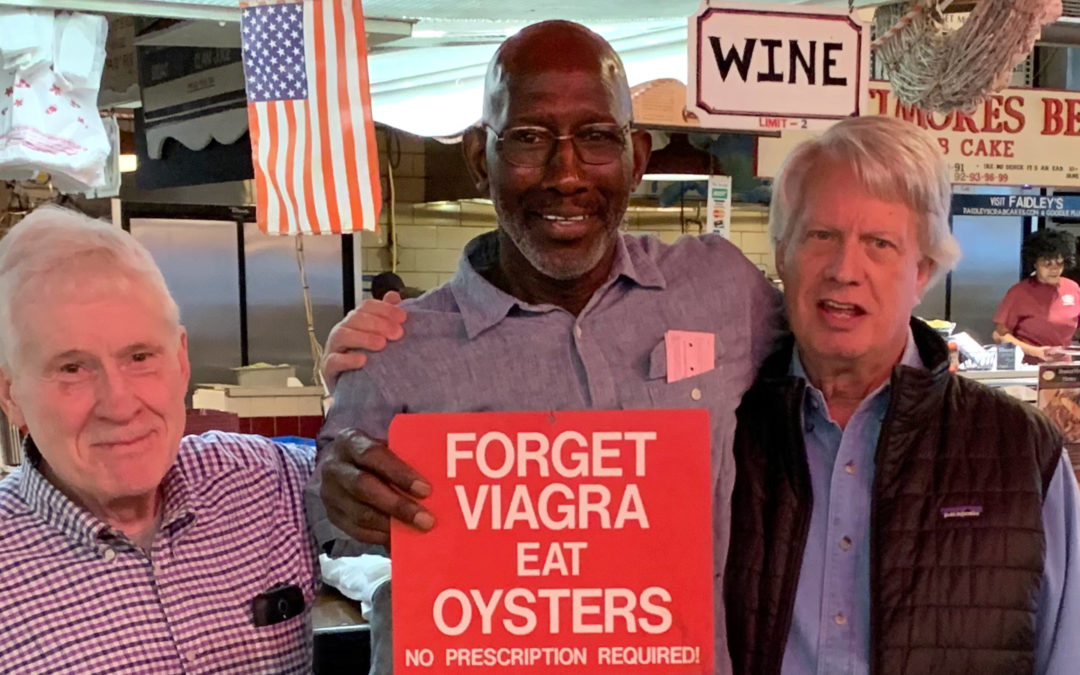
by Robert Bowie, Jr. | Jan 14, 2020 | Featured, Law
There is only one lawyer I know who will go to heaven — Mike Millemann. He recently wrote a law review article about a theater class aimed at teaching law students how to be better lawyers, which we taught together several years ago at The Carey School of Law at University of Maryland. The class was both bizarre and beautiful.
The students were tentative at first but, by the end, definitely loved it. In almost every case, the students were amazed by a third dimension this class offered to their law school education: compassion as it is embodied by our professional responsibility.
One of the students commented:
“Ten years from now, I am certain that when I am asked to share my most eye-opening class in law school, I will mention this class. It has been a learning experience that no other law school class that I have taken can come close to in comparison.”
The model for the class came from the stories of African American males incarcerated and serving life sentences in Maryland, who were later exonerated because they were determined to be completely innocent.
At the first class, one of these innocent men who had spent most of his life incarcerated under a life sentence, was introduced to the class. He quietly answered the student’s questions, remarkably without anger.
Each of these men had been through hell and had escaped it unexpectedly, and they shared that experience.
Throughout the writing and performing process, the students learned in a way that is completely different than the traditional law school education.
After going through trial transcripts, appellate briefs, the underlying facts and the law of each case, the students wrote a play. They collaborated, they wrote the roles of corrupt prosecutors under public pressure and eager for a conviction and incompetent defense lawyers who took $300 from the family of the defendant and provided only half-day trials in capital cases without prior research or exonerating witnesses. But also, the students wrote the story of the diminished hope and desperation of family members who were in shock by the verdict, and who over time grew despondent about American justice.
And then the students lived the roles which they created as they performed their play before a live audience.
In one case, Michael Austin, who had been recently released and had taught himself music during his incarceration, stayed with us throughout the class and was asked to join a class member at the side of the stage to add musical accompaniment.
In the last scene, the governor of Maryland announced publicly that Michael Austin was to be released. On stage, the student playing Michael Austin was asked: “Are you angry about what has happened to you?”
To the extreme surprise of the audience, Austin, barely noticed previously, took center stage and announced: “I am Michael Austin and I am thankful for the lawyers who accomplished my release and for the efforts of this class and this law school for telling my story.” From the surprise, came tears in the audience.
But more importantly, the class had learned what law school doesn’t teach: that a lawyer, when he or she takes the oath required to be licensed, has a greater responsibility to the society than almost everyone else. The oath is not a license to make money. It is a responsibility to “protect the Constitution” and the democracy in which we live.
The brilliant Elliot Rauh, a founding member of Single Carrot Theatre and I worked together on this class, but the suggestion and support for the project came from Professor Michael Millemann. He is going to heaven for his lifetime commitment to public justice and the unfairly incarcerated, and for this class.
Professor Michael Millemann’s article has already been accepted by one law review for publication and others are expected to express interest. When it is published, I will post where it can be read.
Featured in the photo: Michael Millemann, Michael Austin, Robert Bowie, Jr.

by Robert Bowie, Jr. | Jan 7, 2020 | Featured, Politics
We deserve better than this.
Senator Lindsey Graham just announced that the Senate might change its rules to require Nancy Pelosi to submit the Articles of Impeachment to the Senate so that the Senate can have a trial (and McConnell now claims to have the votes to prohibit testimony and new evidence).
There are two problems with Senator Graham’s analysis.
First, the Constitution won’t allow it. Senator Graham apparently has not read Article 1, Section 2: “The House of Representatives… Shall have the sole power of impeachment.” And Article 1, Section 3: “The Senate shall have the sole power to try all impeachments.”
The House is the prosecutor and the Senate is the jury. So, until Nancy Pelosi decides to present the Articles of Impeachment to the Senate, the Senate can’t do anything but wait.
Second, the situation does not allow it. Every day new evidence comes out that has been withheld by the President and should have been part of the impeachment articles.
The House should reopen the impeachment hearings, subpoena the witnesses and documents, hold those that do not comply in contempt, and wait until they comply.
As I have written previously, the Speaker of the House in an impeachment proceeding has a duty to every citizen of the USA to ensure that the constitutional requirements of an impeachment trial will be carried out before she proceeds to the trial in the Senate. She is the lead prosecutor. That is her duty.
It would be a dereliction of that duty, a violation of the Constitution, and an acquiescence to obstruction of justice to proceed with a trial knowing that the defendant is withholding witnesses and documents, and that the jury has predetermined a verdict of acquittal before the trial begins.
She must wait for the federal courts to enforce the Constitution and order the witnesses appear and the documents be produce and are available for consideration at the trial before the Senate. She must not compromise . She must put the spotlight on the head-on collision between fascist partisan politics and the clear violation of our Constitution . The politicians are in control and we deserve better than this.
The senators will take their oath “of objectivity” and for many the hypocrisy quite possibly can’t be stopped. (It might be fun if the prosecution asks Chief Justice Roberts, the judge in this case, for the right to voir dire the jury to determine if there is pre-existing bias, which should require disqualification of senators who have publicly stated that they have made up their minds and are working for the defendant.) No matter what, however, Pelosi must wait for the federal court’s rulings requiring the testimony of witnesses and production of documents.
We can wait. Time is not the enemy of the country in all of this, but it is the enemy of an obstructionist defendant.
President Trump and Senator McConnell will show their hand if they lambast Pelosi for waiting for a court ruling, because they will show that the court and the delay is what they really fear.
They want to force a vote by a biased jury so they can declare victory in the President’s campaign. But if they are forced to wait, and they lose in the courts (as they will) before or even after the election, they will not be able to sweep their obstruction under the rug. It will be a historical record. It will be irrefutable.
Time is not the enemy! Given the time and a chance to talk together, more people will have a chance to understand and get it right. Nixon was elected by every state of the union except Massachusetts. Two years later, he resigned when it became clear he was about to be impeached by a bipartisan vote.
So, in fact, time and the Federal Courts are Pelosi’s ally. The more she waits out the storm and requires that the Constitution be respected, the more President Trump and Senator McConnell will be punished for their stonewalling and other violations when the courts rule against them.
Even though it is presently unsubstantiated, I fear that the President may attempt to use a foreign conflict to unify the country to avoid further focus on the impeachment. If that turns out to be true, that would be both frightening and further grounds for impeachment.
This must not be about election politics. It is about whether we can hold on to our Constitution and who we are as a country.
The question is: Does Pelosi have the guts to withstand the storm and represent all the people of the United States, not just the Democrats?
These are horrible times for all of us. The politicians must not control and divide us. We deserve all the facts and an unbiased jury. We are all Americans and a fair trial is the very heart of what keeps us free.

by Robert Bowie, Jr. | Dec 31, 2019 | Featured, Law, Politics
Regardless of how partisan things seem, Nancy Pelosi’s duties no longer run exclusively to the Democratic Party.
As Speaker of the House in an impeachment proceeding, she has a duty to every citizen of the USA to ensure that the constitutional requirements of an impeachment trial be carried out before she proceeds to the trial in the Senate. She is the lead prosecutor. She is an officer of that court.
It would be a dereliction of her duty, a violation of the Constitution, and an acquiescence to obstruction of justice to proceed with a trial knowing that the defendant is withholding witnesses and documents, and that the jury has predetermined a verdict of acquittal before the trial begins.
She must wait for the federal courts to enforce the Constitution. She must not compromise for anything less. She must put the spotlight on the head-on collision between fascist partisan politics and the clear violation of our Constitution, and have the Federal Courts confirm the Constitution and her protection of it.
The senators will take their oath “of objectivity” and for many the hypocrisy quite possibly can’t be stopped. (It might be fun if the prosecution asks Chief Justice Roberts, the judge in this case, for the right to voir dire the jury to determine if there is pre-existing bias, which should require disqualification of senators who have publicly stated that they have made up their minds and are working for the defendant.) No matter what, however, Pelosi must wait for the federal court’s rulings requiring the testimony of witnesses and production of documents.
Time is not the enemy of the country in all of this, but it is the enemy of an obstructionist defendant.
President Trump and Senator McConnell will show their hand if they lambast Pelosi for waiting for a court ruling, because they will show that the court and the delay is what they really fear.
They want to force a vote by a biased jury so they can declare victory in the President’s campaign. But if they are forced to wait, and they lose in the courts (as they will) before or even after the election, they will not be able to sweep their obstruction under the rug. It will be a historical record. It will be irrefutable.
No, time is not the enemy! Given the time and a chance to talk together, more people will have a chance to understand and get it right. Nixon was elected by every state of the union except Massachusetts. Two years later, he resigned when it became clear he was about to be impeached by a bipartisan vote.
So, in fact, time and the Federal Courts are Pelosi’s ally. The more she waits out the storm and requires that the Constitution be respected, the more President Trump and Senator McConnell will be punished for their stonewalling and other violations when the courts rule against them.
It is not about the election. It is about whether we can hold on to our Constitution and who we are as a country.
The question is: Does Pelosi have the guts to withstand the storm and represent all the people of the United States, not just the Democrats?
No guts, no glory, Nancy. Weakness won’t work. “Oh, say can you see?” We will see soon enough.
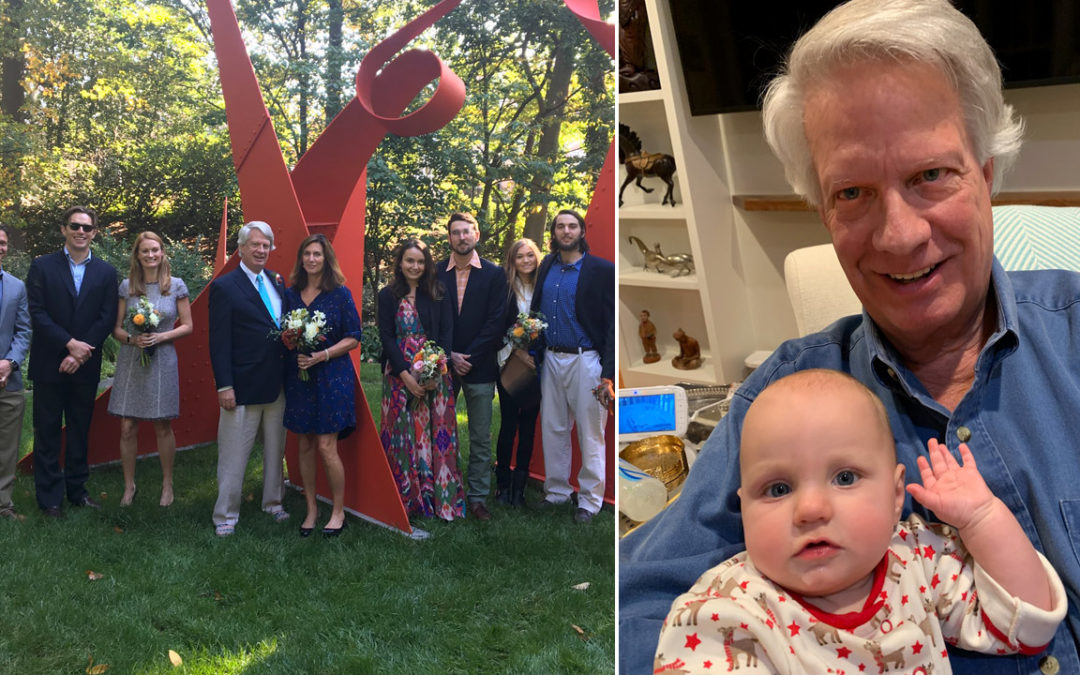
by Robert Bowie, Jr. | Dec 17, 2019 | Featured, Plays, Poetry
Perhaps because I am older, or perhaps because I am now a playwright and a recovering lawyer, I decided I would make a commitment to a more spiritual Christmas this year.
I committed to finding a passage out of the comfortable consumerism, “Jingle Bell Rock” on the radio, Alvin and the Chipmunks and the hula hoop, and into a less self-deceptive and more spiritually aware holiday.
My problem is I excel at self-deception.
In the past, I have always believed that I was sufficiently into the festivities to fool myself, and I would let the transformative spiritual moment gently pass.
No, in truth I am a wizard of self-deception.
I fool myself in little ways all year long as I artfully keep my “spirituality” — like my “modesty“ — at bay.
For example, I have a room right next to my study that contains the framed memorials of the important accomplishments (of which I am so very proud) from my life as a lawyer and playwright.
When I enter this room, I am reminded that I don’t take myself too seriously, because it also contains a sink, a toilet and extra toilet paper. But of course, it is not a private bathroom. If nature calls, our guests are forced to see what I am proud to believe I have made of myself, framed and on the walls when they lock the bathroom door behind them.
I have employed this same gift of willfulness and self-deception when I have prepared myself to let the holidays gently pass by each year.
But as I have said, I think things have changed now that I’m a playwright and recovering lawyer.
I have been forced to see things less as an advocate and more as an observer.
A judge or jury renders a verdict, but there is no redemptive celebration thereafter. Rectifying and resolving social wrongs, if that happens at all, offers no thought of spirituality and in my case, may regrettably explain the bathroom.
But as a playwright, I have come to observe that my plays are meaningless unless the actors commit to giving them life and the audience commits to embracing the performance and the work.
So I have observed that some ethereal things do not come to pass at all unless there is belief, commitment, and then action.
This year, I will find the time for that individual commitment and action on Christmas Day. After I celebrate the joy of being with my family, I will take a walk — perhaps just a little walk — out by myself alone and consider the universe, which I do not understand. I’ll stop for a moment and realize that even if I have no belief in a heaven or a hell, I accept that cold hand of “grace,” which is what so much of religion and spiritual faith is about. And then when I return back home, I’ll try not to see if anyone is locked and reading in the bathroom.
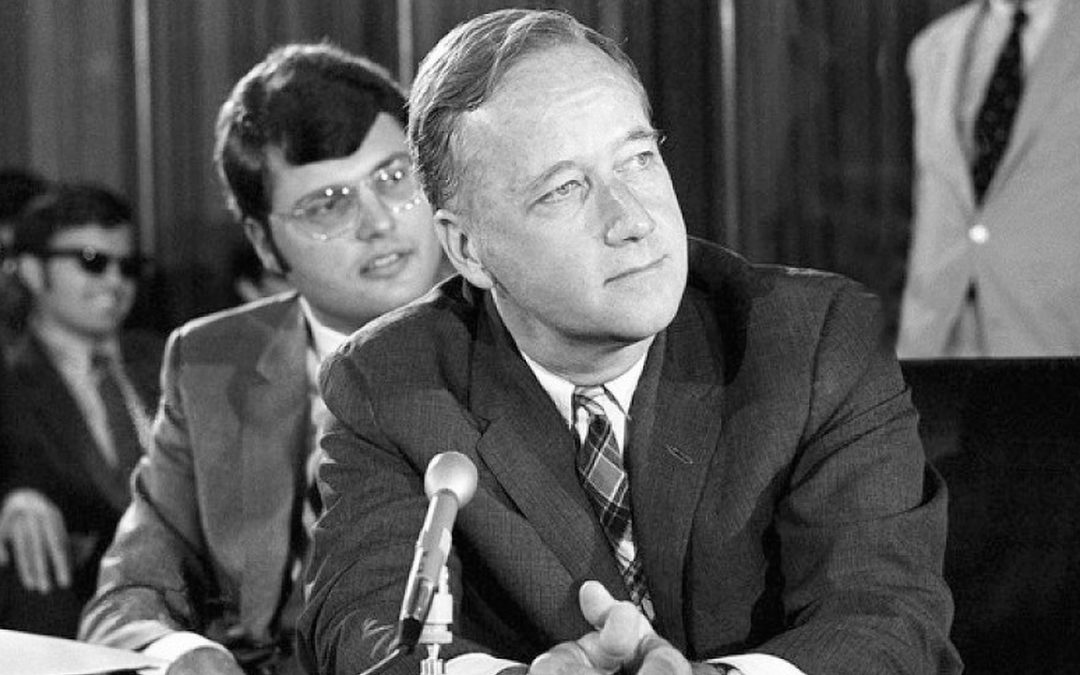
by Robert Bowie, Jr. | Dec 10, 2019 | Featured, Politics
Today, I am mourning a Republican U.S. Senator that I was fortunate to know and serve during the impeachment proceedings of Richard Nixon. I must be wrong.
As the Republican-controlled United States Senate will soon consider impeachment, I have grown horrified by the contrast between what I thought I remembered and what I see today. I must be wrong.
So I went back and reread Senator Charles “Mac” Mathias’s obituary to check my recollection. I will quote the obituary from The New York Times below:
“In a 1974 campaign speech [Mathias] quoted Burke’s 1774 letter to the Electors of Bristol: ‘Your representative owes you, not his industry only, but his judgment; and he betrays instead of serving you if he sacrifices it to your opinion.’”
I thought I remembered that Mathias believed he served the constitution rather than a political party and did not hesitate to practice these beliefs and defend them publicly:
“I’m not all that liberal,” he told The Washington Post in 1974. “In fact, in some respects I’m conservative. A while ago I introduced a bill preserving the guarantees of the Bill of Rights by prohibiting warrantless wiretaps. I suppose they’ll say it’s another liberal effort, but it’s as conservative as you can get. It’s conserving the Constitution.”
I remembered that Mathias exercised these beliefs often at his own expense.
“However he described them, his votes, his vocal unhappiness with the growing conservatism of the Republican Party and his lack of support for Ronald Reagan cost him leadership positions. In 1979, Senator Strom Thurmond maneuvered to block Mr. Mathias from becoming senior Republican on the Judiciary Committee.”
Although he desperately wanted to be the chair of the Senate Judiciary Committee, he saw his responsibilities to serve a greater bipartisan agenda.
“His Senate colleague for many years, Paul Sarbanes, Democrat of Maryland, said Monday that while Mr. Mathias’s ‘most intense critics were within his own party,’ nevertheless ‘Mac commanded enormous respect on both sides of the aisle.’”
Mathias practiced the clear intent of the Constitution, unlike the recent Republican appointees to the Supreme Court who affirmed Citizens United and refused to address the political polarization of gerrymandering.
“Mathias advocated public financing of campaigns and ceilings on contributions (measures enacted the next year). He said that in his 1974 campaign he would reject cash contributions, take no more than $100 from any individual, report every contribution and expenditure”
My recollection was correct.
All that is gone now. The strict constructionist of the Constitution will cite the clear definition of treason, which requires aiding and abetting the enemy at the time of war, and will think nothing of a President and political party that will not impeach a president for turning foreign affairs to his political benefit, who refuses to fight and actually encourages the support and intervention of foreign governments in our elections.
All that is gone now, as our foreign policies, so carefully crafted after WWII to support the allies of freedom, crumble as we abandon the Kurds to Russia, and our allies in South Korea and Japan to the threat of North Korea, as it continues missile testing despite hollow promises to us. And finally, and perhaps most painfully, Europe turns to others as we let NATO and the European Union crumble before our blind eyes.
The Republicans will let the impeachment fail. But if the country gives this president another term, America, a shining “city on a hill,” will be gone as we know it.
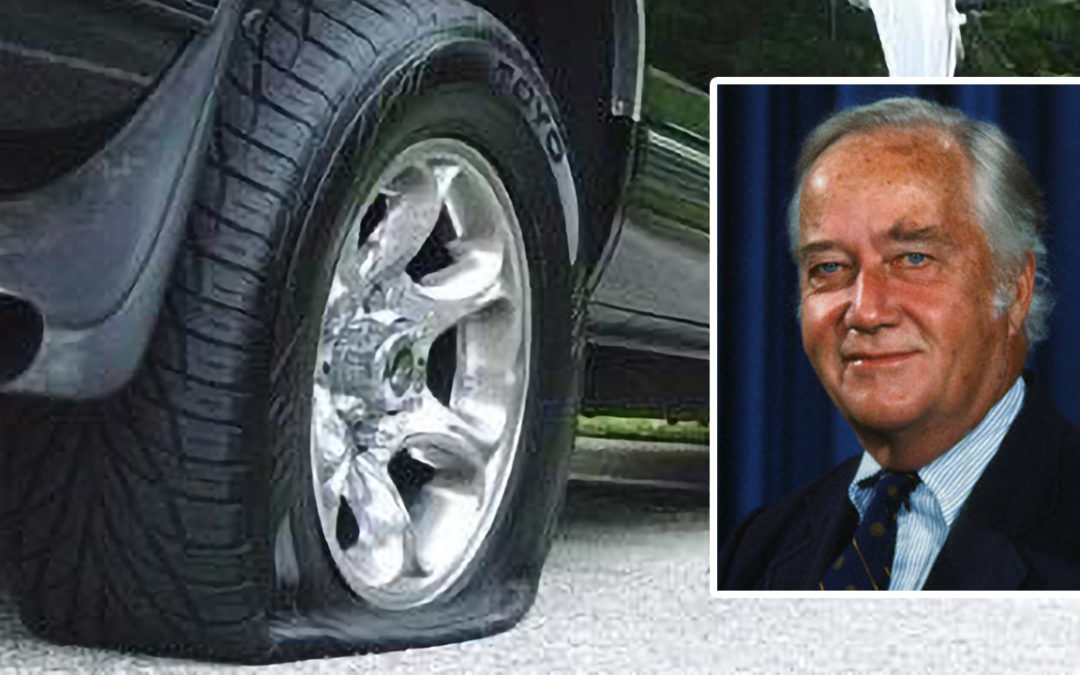
by Robert Bowie, Jr. | Dec 3, 2019 | Featured, Personal, Politics
You can call it “fake news” or the subjugation of truth, but when confronted by self-serving diatribes and obstructionist partisan arguments, I saw several witnesses at the impeachment hearings persist and tell the truth — or at least preserve its credibility — no matter how difficult that was for them.
When I was a driver for U.S. Senator Charles “Mac” Mathias’s (R-MD) during the Watergate proceedings, news and politics were different than today. Credibility was everything.
On TV, Walter Cronkite delivered the truth on the CBS Evening News. He was voted the most trusted man in America.
The newspapers never had that power of personality, but they doggedly stood behind their stories, even when they relied upon undisclosed sources like “Deep Throat.” They knew they were at risk every day.
Credibility sold the news, and advertising, and paid for heavy overhead and lots of investigative reporters.
Today, news sources on the web do not need credibility. They have followers instead.
They are also not at risk because they have few, if any expenses, and are often not even identifiable. Social media is flooded with unverifiable news sources, some of which are paid for by our enemies as they seek to disrupt our country’s elections.
Senator Mathias was from Frederick, Maryland — farm country — two hours west of DC. He was fiercely loyal to his city and his state. He cherished his reputation for integrity and his nickname, “The Conscience of the Senate.”
It was different back then, but it is still the same.
I was driving Mathias when he was summoned by President Nixon to an afternoon rally the next day. Mathias was to be filmed beside Nixon for the evening news that night. Mathias had, in essence, been summoned to give the President an unspoken endorsement in Maryland’s Washington suburbs, in Mathias’s home state.
Maryland is an overwhelmingly Democratic state. Mathias was no fan of Nixon and Nixon knew it, but Nixon was a Republican and so was Mathias.
Credibility was everything to Mathias but he couldn’t say “no” to the president without punishment from his party.
I picked the Senator up at his home that morning and we headed to his scheduled meetings.
The first thing he said to me as he got into the car was, “looks like that tread on the left rear tire is thin.”
After the morning meetings and before lunch, I offered to take the car to get the tire checked, but Mathias said he wanted me inside to record his speech on the handheld tape recorder I always carried with me for such occasions. He made sure he was never misquoted.
After lunch, as he got into the car he pointed and asked me, “You think it looks like that tread is dangerous?”
I insisted that I get the tire checked immediately so we would be on time for the rally.
The Senator thought for a judicious moment. “I think you are right, Bob. Let’s get it looked at.” But as I turned into a filling station he quietly said, “I have always bought my tires up at the Goodyear store in Frederick.”
By the time we got back to Washington, the rally was over. As I let him out of the car that night, he asked me to remind him to send his apologies to the White House.
To maintain credibility in the face of power, persistence may not always offer the opportunity to speak the truth. But at least it’s a statement on its own: the resistance is a placeholder for the truth, and it retains our gravity.
It is different now, but it remains the same.
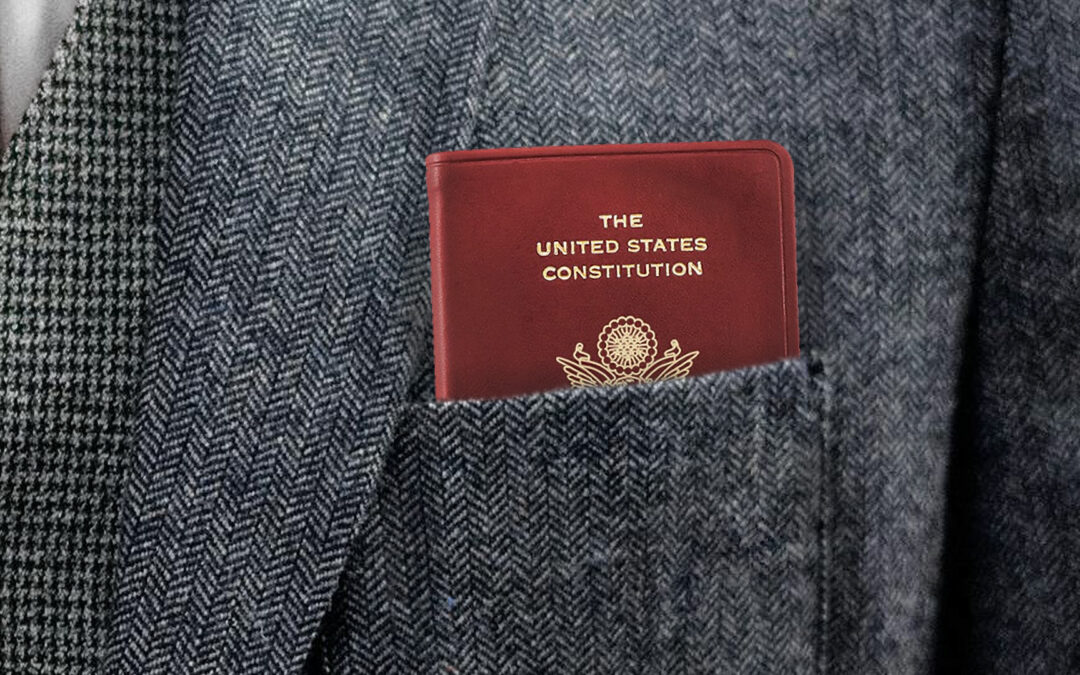
by Robert Bowie, Jr. | Nov 26, 2019 | Featured, Law, Politics
I remember when Congress actually had good manners and I almost got a chance to cite the Constitution in traffic court.
Many years ago, from within a culture of politeness, I watched the U.S. Congress impeachment proceedings of Richard Nixon. Now, 45 years later, this culture of politeness in Congress doesn’t exist, but back then it seemed to have several benefits.
I got a job in the office of Senator Charles “Mac” Mathias (R-MD) as his mail clerk. My “office” was directly behind the wall that separated me from the receptionist and everybody else.
After several months, I got a chance to demonstrate my enthusiasm. The Senator knocked on my door and told me he had a “special assignment” for me.
He told me that there was a lobbyist right on the other side of that wall who was sitting in the receptionist area. The lobbyist had just threatened to pull all of his airline clients out of BWI unless the Senator voted in favor of a bill that would be considered by the Senate that afternoon.
The senator told me to take the lobbyist to the Senate dining room and take detailed notes on what he wanted.
I straightened my tie, went through the door, and introduced myself.
After a brief moment, the lobbyist looked me over and asked me, “What exactly is your job title?”
I proudly told him, “I am the mail clerk!”
He thanked me, declined my invitation to the Senate dining room, and left.
One of the benefits of this culture of politeness was it encouraged good manners without public reprimand.
The Senator eventually took pity on me and I became his driver.
Back then, the Senate was bipartisan and the senators got along. We filled up the back seat with the likes of Kennedy from Massachusetts and Tower from Texas. We all listened to the political news in the car together on WTOP.
Despite often radically different points of view, this civility grew from a collective belief that these representatives were exercising a shared power. It made sense. This responsibility of shared power allowed a culture of compromise and progress that we have not seen since the country has been polarized.
There was a reverence on both sides for the Constitution. Mathias always had a copy in his coat pocket.
No one was immune from this culture, including me. One time as we were headed to Washington from the western part of the state, Mathias leaned over to me, turned down the radio, and said, “We can pick it up a little. You are going to law school. If we get pulled over, you will be able to cite the Constitution to the officer.” Mathias smiled as he patted his coat pocket. “It is illegal to hinder a member of Congress on the way to a vote.”
I never asked him for the chapter and the verse. I just drove a little faster. It just made sense.
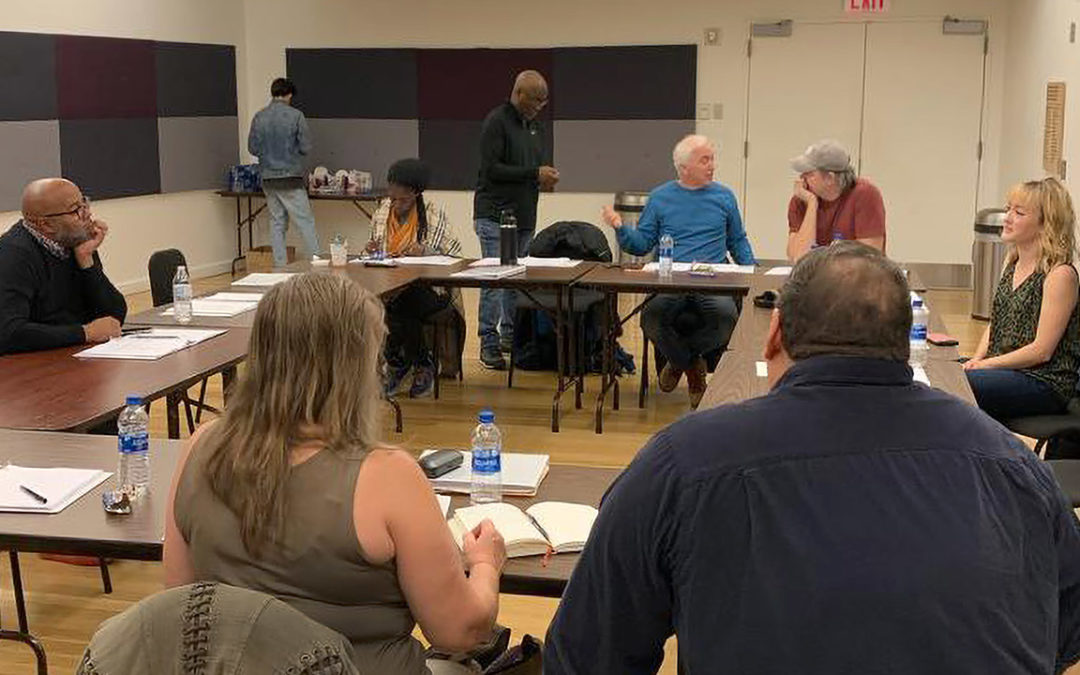
by Robert Bowie, Jr. | Nov 19, 2019 | Featured, ONAJE, ONAJE Update, Politics
Sometimes, it seems as if Amtrak travels through America’s subconscious.
Last Sunday, on a cloudy afternoon, I took the train up to NYC for the “table read” of my new draft of Onaje. I put The New York Times on the seat next to me and looked out at the graffiti on the abutments of the bridges and junked cars in back yards.
We are divided by our politicians, but are we now divided from our children too? I had read about why the “millennials” blame the “baby boomers” for the world they have inherited and had wondered if there was a common beginning to all of this.
The millennials don’t have the ”spoiled child” anger of “sex, drugs and rock & roll” and “never trust anyone over the age of 30,” which was the mantra of my generation. Their anger is the residue of all that.
We were born into the rich, expanding post-war economy. They want a job to pay off the student loans for the education to get the job they never got.
How could this have happened?
To placate us, President Lyndon Johnson, ended the draft. Our parents — all of them — had been drafted and went to war together to defeat fascist nation states and rebuild a capitalist Europe, to allow free trade to rebuild the devastated nations that we had defeated, and then to break down walls to offer freedom for others.
For the college-educated boomers, it had been acceptable to avoid the draft, because we didn’t approve of the war.
Unintentionally, by doing so, we split the nation the millennials inherited into the privileged rich who would not, and the working poor who would fight our future foreign wars and salute our flag, after the privileged draft-dodgers had felt free to burn it.
The thing is, the “privileged” never followed through. After we graduated, the Peace Corps and public service became old news. We had bumper stickers that said: “The One Who Dies With The Most Toys Wins.”
We were too self-obsessed to notice that the seeds which had created WWII were composting here in our country as we let the economics of disenfranchisement grow.
NAFTA would bring those seeds to bloom with immigration reform. It was predestined, as the privileged got richer and the jobs of the working poor left town, and women still remained unprotected ( “Me Too”), and the city slums expanded ( “Black Lives Matter“). The white working poor were easily fanned into racist hate as they were left behind.
It was painfully ironic on Monday, at the reading, when the actors brought the past into the present. They brought to life a play about savage racist riots which happen in 1967, just as the early boomers went off to college.
It was painful to see how the cast of white and black Americans could so brilliantly bring the hate and violence between the races to life, and then break from their characters and become friends so easily and talk and laugh. It stood in stark contrast to the story of the play and to the anger presently in our country, now so divided that even families are unable to communicate.
How could this be? It may be that the actors had a common goal that was bigger than any individual in that room. They needed each other and enjoyed each other as they brought that common goal to fruition.
Perhaps the boomers thought only of themselves. The one percent now has all the toys. In the end, we are what we do, not what we say. We said we were ”peace and love,” but we had no commitment to anything other than to our avarice and greed.
We earned Trump and his bone spurs. He is one of us.
I have provided the names of these wonderful actors. Watch for them on TV and on the New York stages. They are each and everyone of them brilliant: Joe Dellger, C.E. Smith, Tim Rush, Khiry Walker, Adam Couperthwaite, Laura Darrell, Mary E. Hodges, Johnny Shea, and Erin O’Brien.
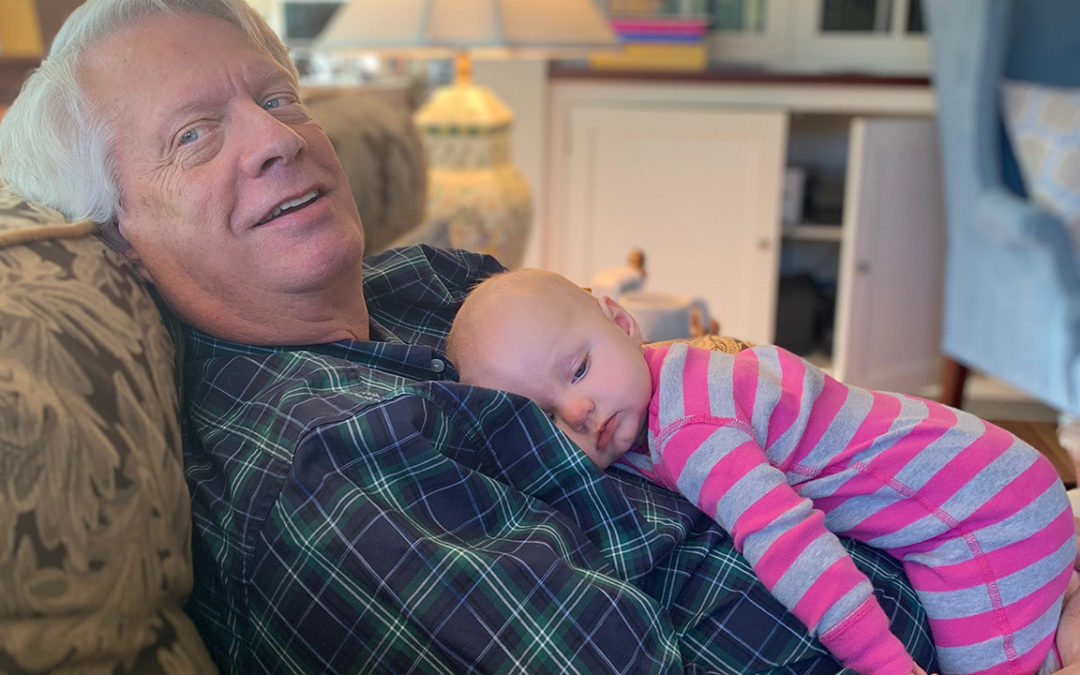
by Robert Bowie, Jr. | Nov 12, 2019 | Featured, Politics
So this is what an old progressive thinks he learned from his granddaughter:
Last Sunday afternoon, before my visiting daughter and son-in-law went off to the 8:00 PM Ravens/Patriots game, I volunteered for the early morning shift of “baby duty” the following morning, so they could sleep a little later the next morning.
When Ann, my granddaughter, woke up at 6:00 AM, I fed her her first bottle of the day and we settled into the couch to read a book as we listened to a little Oscar Peterson.
Ann is a very mellow child — unless she is bored. When she is bored, she will cry a little until you introduced her to something new for her to look at or listen to.
When reading books finally didn’t do the trick, we cruised the house looking at artwork and the photographs on the shelves. She was verbal in her approval and remarkable in her concentration.
After a while, we returned to the couch and she bounced gently on my knee to Oscar’s rhythms until she fell asleep in my arms, her head on my chest.
Although we have known each other for her first six months, that morning something had changed. I had listened to her and she had trusted me enough to go to sleep as I was holding her.
We all live under a set of laws which are enforced in different ways. The government issues tickets for speeding or going through a stop sign, but the rules of the road are enforced by indignant drivers who honk their horns.
Nationally, we are punished for violations of federal laws or state laws, but in much of our country also, for violations of “political correctness.” The first two are enacted by our legislatures and interpreted by our courts. The third is the law of a progressive culture, and the rules of this road are now also enforced by the indignant. For them, it is as it is on the highway. There is no appeal for those who they judge to violate these rules, other than an extended middle finger.
Many of the front runners in the Democratic party, with the best of intentions, seek to codify many of these rules. They are indignant at those who wrongly disagree about America’s history of immigration, climate change, universal healthcare, women’s rights, and the rights of gay and transgender people. They have passionate supporters who look down their nose at the “undereducated,” who do not understand the new and better rules of the road.
When Alice and Rick, my natural children, were born they were “my” children and I demanded that I hold them almost immediately after their birth. There was a genetic bond from the start. But with my granddaughter, she is once removed and it was up to me to earn my place in “her” family. With both, I was equally as paternalistic and well-intended, but the relationship was different.
It is easy for a political party to advocate the “obvious” good intended for our country and its people, but how that message is received is the issue, particularly when these rules are seen to threaten the livelihood, safety, and patriotic beliefs of the unconverted.
Further, this intolerance makes it easy to drive a wedge between the two sides and demonize the believers in order to polarize the fearful.
The most effective advocacy starts with listening and empathy if you want others to be part of your family and you want to be part of theirs.
My granddaughter had a voice, if not words, and I had to win her respect and trust. If I had imposed my effort to teach her reading, or required she love the genius of Oscar Peterson, that trust would never have developed as it did.
We are not enemies. We are Americans that disagree. Trusting enough to listen may get us what we want.

by Robert Bowie, Jr. | Nov 5, 2019 | Featured, Politics
As the pendulum swings we run out of time.
You know that old joke about if there is one lawyer in town he will go broke but if there are two they both get rich? I keep thinking that’s how our political parties presently work.
But what is wrong with good old American “enlightened self interest”? I mean the two lawyers are not evil or anything. They didn’t intentionally get rich. Same with our political parties.
It is convenient that there are two sides to every conflict, which could potentially become volatile and polarize us — hot button “call to action“ advertising helps but “propaganda” and “false news” really works great! Gerrymandering is just organizing and expanding the zip code of the client base when the holiday cards go out.
Somehow politicians go in poor and end up rich when they come out. How does that happen?
Almost five years ago, to the day, I ran for office in a gerrymandered Republican district and got crushed. I believed back then the people in my district would recognize that the gerrymandering by our politicians was starting to be responsible for the polarization of our country. We knocked on almost 7,000 doors. When I dropped off my literature, I talked to the people I met and almost every time, we joked and enjoyed each other’s company until I was asked, “Republican or Democrat,” at which point the door was slammed in my face.
The polarization now is much worse than when I ran, because it affects not only our country but our place in the world and the “moral authority” we have championed since the Second World War as “leaders of the free world.”
Last month, with the knee-jerk fulfillment of a campaign promise from our last polarized election, we abandoned one of our most loyal allies, the Kurds, who suffered over 11,000 casualties in our battle to eradicate ISIS in northern Syria (we supplied mostly air strikes and lost almost no soldiers). Now we are no longer able to claim to be their trustworthy ally:
Victoria Nuland, who spent more than three decades in the U.S. Foreign Service as a top Russian policy expert and representative to NATO, Ukraine, and Europe during the administrations of George W. Bush and Barack Obama, recently said in an interview with the Harvard Gazette:
“When you are an unreliable ally, then countries and leaders around the world who have bet their security by being on your team have to start hedging their bets and developing multiple relationships… We’ve already felt it vis-à-vis our ability to influence Turkey’s behavior; we’re certainly going to feel it now in Iraq. Israel has been hedging for quite some time in terms of its relationship with Iran. And you see it in other aspects of U.S. foreign policy. Why should the Germans listen to us when we say, “Don’t deepen your economic and information relationship with China?”
It would seem that this must eventually affect every aspect of our life including how safe we feel at home and the cost of the international products we buy in our stores.
Under the constitutions, state and federal, our politicians control the shape and parameters of the political districts from which we elect them. This could obviously be a very powerful tool to make sure that they get elected in a greater proportion than what would otherwise be appropriate.
The Supreme Court has had numerous chances to address gerrymandering but has refused to do so: “Partisan gerrymandering claims present political questions beyond the reach of the federal courts,” Chief Justice John Roberts ruled in a decision that split the court 5-4. He was joined in the decision by Justices Clarence Thomas, Samuel Alito, Neil Gorsuch and Brett Kavanaugh, the court’s conservative wing. Polarization in the Supreme Court, too?
The real trouble is polarization cuts both ways. The Supreme Court, with this ruling, has determined that the Democratic Party in Maryland can constitutionally keep Republicans from having equal representation in the State of Maryland.
According to the Republican appointees to the Supreme Court, our politicians and political parties control our democracy, we don’t.
So what do I suggest? Before that second lawyer moves into your neighborhood, run out the first one. Then meet somebody with whom you disagree, discuss your differences, learn again how to listen, and then figure out a compromise together and do what only you can do. Overturn the Supreme Court and vote out any politician who won’t overturn gerrymandering, and by so doing, help make America great again!










